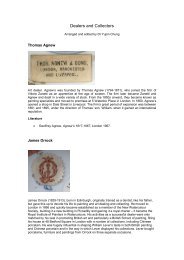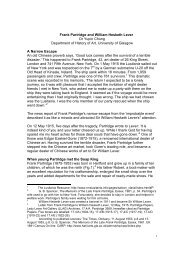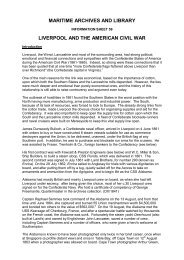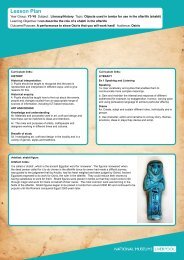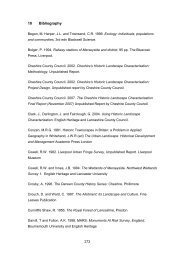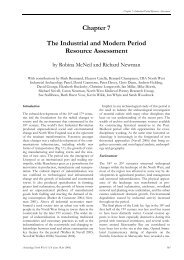Business-Business Collections no60 - National Museums Liverpool
Business-Business Collections no60 - National Museums Liverpool
Business-Business Collections no60 - National Museums Liverpool
You also want an ePaper? Increase the reach of your titles
YUMPU automatically turns print PDFs into web optimized ePapers that Google loves.
ARCHIVES DEPARTMENT<br />
INFORMATION SHEET 60<br />
BUSINESS COLLECTIONS<br />
The Archives Department is responsible for a number of collections that range from the<br />
business records of local manufacturers to local societies and research collections, and<br />
includes the records of our parent organisation, <strong>National</strong> <strong>Museums</strong> <strong>Liverpool</strong>.<br />
The business collections are a diverse collection that may be of interest to those studying the<br />
social and economic history of <strong>Liverpool</strong>, charting the types of businesses in <strong>Liverpool</strong> or<br />
studying business history.<br />
<strong>Liverpool</strong>, at the turn of the 18 th century, was well connected by sea and the port became<br />
England’s leading Atlantic city port; it was a cauldron of diversity and growth. The development<br />
and rise of the port system are well documented elsewhere (see Information Sheet 34: Port of<br />
<strong>Liverpool</strong>).<br />
<strong>Liverpool</strong>’s trade potential was further extended after the building of the Leeds-<strong>Liverpool</strong> Canal<br />
(1774) and the Manchester-<strong>Liverpool</strong> Railway (1829) 1 . Both of these transport innovations<br />
enabled the goods that passed through the port to be transferred throughout the U.K. and vice<br />
versa.<br />
The diverse range of businesses that sprung up in <strong>Liverpool</strong> included electrical and engineering<br />
manufacturers and locomotive production, merchants and exporters, insurers and solicitors,<br />
storage and transit companies and other businesses associated with the main imports to the<br />
port: sugar and cotton. The business collections held by Merseyside Maritime Museum<br />
represent all of these concerns. See Guide to the Records of Merseyside Maritime Museum,<br />
Vol. II, chapter II and Information Sheet 57: Reserve Store <strong>Collections</strong>.<br />
COLLECTIONS<br />
A selection of the business collections include:<br />
Meccano Ltd., 1908-1980<br />
Established in 1908 by <strong>Liverpool</strong> businessman Frank Hornby in order to commercially<br />
manufacture a new construction toy known as ‘Meccano’. The firm was also famous for its<br />
production of railway engines from the 1920s and ‘dinky’ diecast cars from the 1930s. The<br />
company was based in Old Swan, <strong>Liverpool</strong>. The collection includes copies of the Meccano<br />
Magazine, 1949-1966, company records including minute books, financial and legal records<br />
and sales reports.<br />
1 Other notable openings included Birkenhead Railway 1840; the Manchester Ship Canal was constructed between<br />
1887-1894; <strong>Liverpool</strong> Lime Street Station opened in 1836 and was the major terminus for <strong>Liverpool</strong>.
Wingrove & Rogers Ltd., Electrical Engineers, 1915-1986<br />
Founded in 1919 the company specialised in the production of electrical components. Its main<br />
client was another local firm, British Electrical Vehicles Ltd., that it eventually acquired in 1926.<br />
During the 1920s the company was known for specialising in the production of coils for<br />
electrical equipment. The main company premises were in Old Swan, <strong>Liverpool</strong>. The archive<br />
collection includes legal and financial records, photographs and operational records and<br />
correspondence.<br />
<strong>Liverpool</strong> Warehousing Co., Ltd., 1895-1983<br />
For many years the <strong>Liverpool</strong> Warehousing Company was the largest firm of warehouse<br />
keepers in the UK. Its main commodity was cotton. The firm became part of the Transport<br />
Development Group around 1986. The main offices of the <strong>Liverpool</strong> Warehousing Company<br />
were situated at 70 Pall Mall, <strong>Liverpool</strong>. The archives include minute books, legal and financial<br />
papers and also the records of sixteen of its subsidiary companies.<br />
Ayrton Saunders & Co., Ltd., 1885-1986<br />
Ayrton Saunders & Co., Ltd., started out as a manufacturing chemist in 1868 based in Hanover<br />
Street, <strong>Liverpool</strong>. These premises, together with three depots on Park Lane, <strong>Liverpool</strong>,<br />
Prenton, Birkenhead and Burslem, were sold in 1899 when the company was taken over by<br />
A.A.H. Pharmaceuticals. In 1990 the firm moved into new premises on Spindus Road, Speke<br />
Hall Industrial Estate. The firm now operates from its headquarters in Runcorn. In 1997 Mr.<br />
G.F. O’Brien of <strong>Liverpool</strong>, purchased the name and now runs the expanded business from<br />
Runcorn. The archive includes price lists, house magazines and catalogues as well as minutes<br />
and accounts.<br />
Vulcan Foundry Co., Ltd.<br />
Charles Tayleur, a <strong>Liverpool</strong> engineer, founded the Vulcan Foundry at Newton-le-Willows in<br />
1830. In 1832 Robert Stephenson, the well known railway engineer, joined him in partnership.<br />
In 1847 they took over the Bank Quay Foundry in Warrington and in 1852 built their first seagoing<br />
iron vessel, the clipper Tayleur, which was tragically wrecked off Dublin in 1854 en route<br />
to Australia. The partnership was incorporated as a private company in 1864 as the Vulcan<br />
Foundry Co., Ltd.<br />
Vulcan locomotives were exported all over the world, with the first locomotives for Russia and<br />
Japan supplied in 1837 and 1871 respectively. During World War II the factory built the<br />
“Waltzing Matilda” tank and in 1944 Vulcan acquired another locomotive business, Robert<br />
Stephenson & Hawthorns Ltd., based in Newcastle-upon-Tyne.<br />
With the demise of steam, Vulcan turned to diesel and electric locomotives, in conjunction with<br />
the English Electric Co., Ltd., becoming full members of that group of companies in 1955. The<br />
English Electric Co., Ltd., became part of the General Electric Company (G.E.C.) group in<br />
1968. In 1970 Rushton Paxton Diesels Ltd. became the manager of G.E.C. Diesels Ltd., and<br />
today occupies the Vulcan works.<br />
The collection includes minute books, annual reports and letterbooks. Drawings and<br />
photographs of locomotives built 1833-1950 are also held in the Vulcan Archive.
ADVICE AND INFORMATION<br />
Enquiries can be made by letter, telephone, fax and email. We may not be able to answer all<br />
enquiries but will endeavour to point you in the right direction.<br />
We are able to provide copies of material where they are suitable to be copied (items are<br />
copied at the Archivist’s discretion). This is subject to charges to cover copying and handling.<br />
ACCESS & OPENING TIMES<br />
Access is strictly by appointment, please contact the Archivist to book an appointment. Times<br />
can be booked between 10.30 am and 4.00 pm. We are closed between 12.30 - 1.30 pm for<br />
lunch. There is no disabled access in North Street as the Searchroom is reached by two flights<br />
of stairs. Alternative access arrangements could be made in certain circumstances.<br />
CONTACT<br />
Dawn Littler<br />
Curator of Archives<br />
Maritime Archives & Library<br />
Merseyside Maritime Museum<br />
Albert Dock<br />
<strong>Liverpool</strong> L3 4AQ<br />
Tel: 0151 478 4407<br />
Fax: 0151 478 4527<br />
Email: maritime@liverpoolmuseums.org.uk<br />
Website: merseysidemaritimemuseum.org.uk<br />
INFOSHEET60.SS<br />
MMM/DOCS/LR/11.6.04


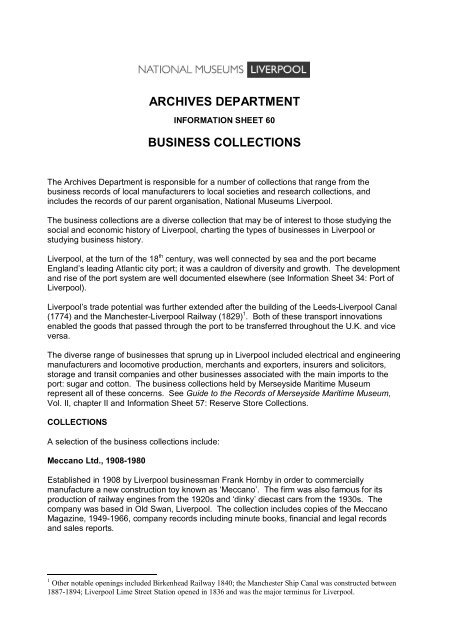
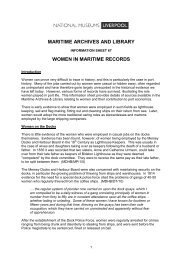
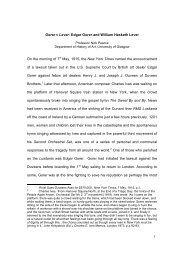
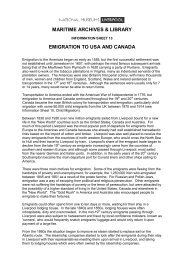
![Ancient Egypt trail [227kb .pdf] - National Museums Liverpool](https://img.yumpu.com/48998817/1/184x260/ancient-egypt-trail-227kb-pdf-national-museums-liverpool.jpg?quality=85)

